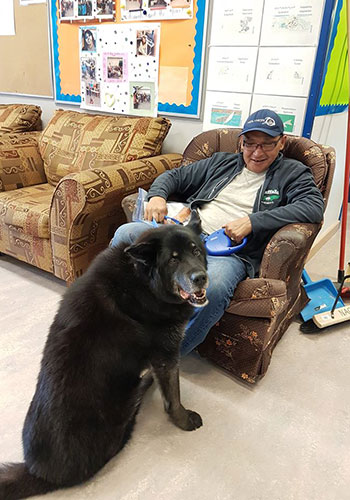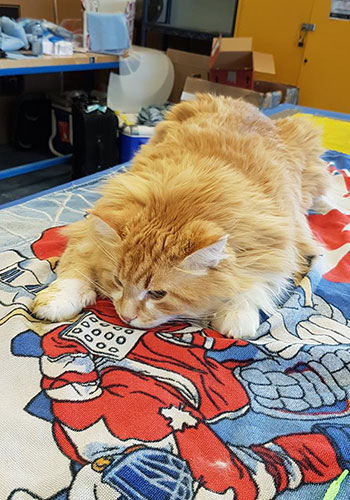NAIT staffer donates time and talent to northern pets

Imagine if you had to fly 800 kilometres to get a simple vaccination for your furry friend. Would you be able to make the trip?
This is a reality for pet owners in Cambridge Bay, Nunavut, who don’t have access to a vet clinic in their community.
Last August, 3 Edmonton-based veterinary professionals joined the non-profit Cambridge Bay Northern Canine Rescue volunteer group and made the trip (at their own expense) to bring vet services to the remote northern hamlet of 1,700 people. Among the volunteer vets was Elaine Degrandpre, senior medical officer for NAIT’s animal health programs.
The group of volunteers set up shop at Nunavut Arctic College for 3 days and welcomed residents with pets who needed surgery, vaccines, deworming, blood tests and more. The vet team treated more than 140 dogs and cats, and performed 39 surgeries. Costs to pet owners were kept to a minimum.
“Without this clinic, Cambridge Bay pet owners would have to fly their pets to Yellowknife to receive veterinarian services,” says Degrandpre who brought equipment from NAIT. “Between the flight and the cost of the vet care, that would be a very expensive trip for them.”
Healthy pets, healthy people
While learning about local pet culture (for example, very few residents have cats) and seeing 24 hours of sunlight were highlights for Degrandpre, the major take-away was the unexpected impact she may have had on the health of the community as a whole.
Cambridge Bay locals typically feed their pets what’s most readily available, which is arctic char or caribou meat. Usually, the animals are given raw meat, which can carry tapeworms. The worms don’t affect the health of the dogs but they can infect people who come in contact with the animals.
In addition to treating the animals, Degrandpre had the chance to share her knowledge about this little-known connection between animal and human health. To prevent the parasite from making its way into human hosts, meat that’s fed to dogs should be frozen or cooked to kill tapeworms.
 “There is great value in having the volunteer veterinarians visit Cambridge Bay," says Denise LeBleu, board member of the Northern Canine Rescue. "The residents always look forward to them returning, and start asking in July when the out-of-town vets are coming in. I believe that the Cambridge Bay pets receive better [health] care now that these volunteers visit us annually."
“There is great value in having the volunteer veterinarians visit Cambridge Bay," says Denise LeBleu, board member of the Northern Canine Rescue. "The residents always look forward to them returning, and start asking in July when the out-of-town vets are coming in. I believe that the Cambridge Bay pets receive better [health] care now that these volunteers visit us annually."
A role for students?
Degrandpre is already planning on attending the next clinic in summer 2018 and hopes that NAIT veterinary technician students can go on future trips.
“This was the perfect way to expand the experience and examples that I can bring into the classroom to help students see how diverse animal care is in Canada,” says Degrandpre.
“Down the road, I see this as a wonderful opportunity for veterinary technician students to expand their skills base and understanding of the animal care industry. I hope to facilitate this trip for students as a part of the NAIT Animal Health and Technology program in upcoming years.”